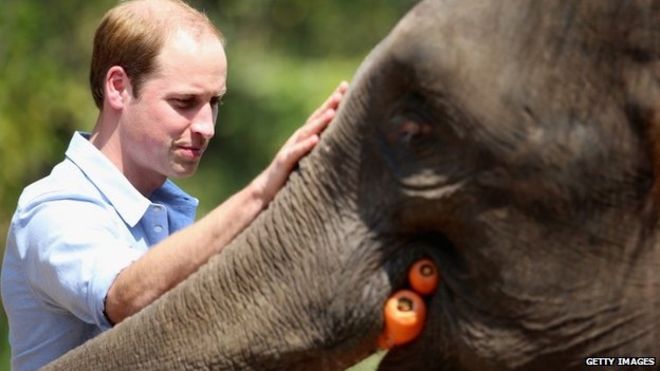
Prince William declares a new initiative to stop wildlife trafficking while supporting trophy hunting
By Amanda Mei
[divider]
[dropcap]W[/dropcap]e know him as the Duke of Cambridge. We know him as the son of Prince Charles and Princess Diana and the man who married Kate Middleton. But now, Prince William has created a new name for himself: as a conservationist.
On Mar. 15, the 33-year-old royal declared a multilateral initiative to stop wildlife trafficking around the globe. 40 corporations have committed to ending the international transportation industry’s role in transporting ivory tusks, horns, and other illegal animal parts. The declaration at Buckingham Palace marked the end of a year’s work for United for Wildlife, the alliance formed by the prince’s royal foundation to unite wildlife charities.
The declaration presented by United for Wildlife’s Transport Task Force includes 11 points about how to deal (or not deal) with ivory. Engaged parties, including the World Customs Organization, Emirates Airline, and World Wildlife Fund UK, have agreed to share information through a database on routes and methods of wildlife trafficking. They will also improve staff training and technology to prevent the illegal trade.
Stressing the campaign’s urgency in an interview with ITV News, Prince William said endangered species might go extinct if wildlife trafficking is not addressed within five years. The Democratic Republic of Congo’s Garamba National Park, funded by the European Union and private donors, has lost 90 percent of its elephant population within four decades, according to a BBC report. The population of rhinos on the continent has decreased 95 percent in the same time.
Apart from these cold facts, Prince William has a personal stake in conservation. He expressed concern that elephants, rhinos, and other endangered animals might disappear from the planet before his daughter Charlotte turns 25. He also said he could picture his son George as a conservation “bum” with bangles and sandals. “Everyone agrees that losing these animals from the world would be devastating,” the prince said.
Lord Hague of Richmond, chair of the task force, seems to agree. With 500 million containers shipped around the world annually and 100,000 flights every day, the lord said said people needed to address transportation in conservation efforts that would be “nearly too late” but “not too late.”
Not everyone agrees with plans to toally eradicate wildlife trade, however. Trophy hunters, for instance, may value endangered animals more dead than alive. They pay huge sums of money for each shot at an endangered animal. Although the prince said he would never hunt the endangered animals for game and condemned Cecil the lion’s killing last year, he also said there was a place for trophy hunting in Africa and the world.
In a well-regulated game reserve, money from killing old and infirm animals would go to conserving other animals. Some conservationists support this idea. But “it’s not everyone’s cup of tea,” the prince admitted. Given a day after the Buckingham Palace declaration, his endorsement of trophy hunting angered a lot of conservationists and media representatives. A spokesman of the Born Free Foundation, which otherwise supported Prince William’s initiative, said trophy hunters had no justification for harming individual animals and contributing to endangered species’ demise. In 2014, the second heir to the throne was also condemned for going on a deer and boar hunt before launching an anti-poaching campaign.
Now, the prince — along with poachers he’s trying (or not trying) to stop — is the target of conservationists. Does Prince William actually care about conservation, or is it just another addition to his name? The prince also defended himself against claims that he was “work-shy” in the television interview. Despite making relatively few public appearances as a royal and working only 80 hours per month as an air ambulance pilot, Prince William asserted that his conservation work was “part of the job” and deferred attention to his new declaration. “There is hope that we can fix stuff,” he said.
Perhaps we can fix things, with the support of Prince William and other celebrity figures. They have the charisma to draw attention to issues such as the vulnerability of African elephants, rhinos, and other animals poached for profit or pleasure. But we also need to criticize these figures when they operate with selfish, non-philanthropic motives or hold double standards. When we expose the moral defects beneath their actions and declarations, for example in the case of Prince William’s support for trophy hunting, we hold conservationists to a higher ethical standard. Otherwise, “conservationist” would be a misappropriated name for someone who likes animals, but only at a distance.
[hr]
Amanda Mei is a sophomore in Berkeley college. Contact her at amanda.mei@yale.edu.